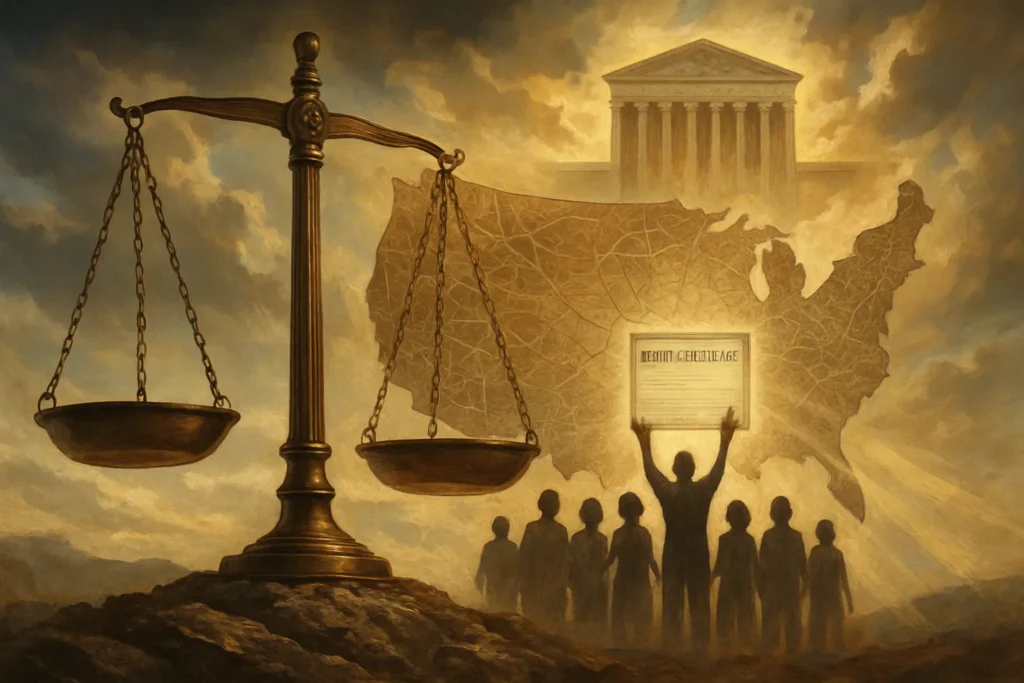Supreme Court Limits Nationwide Injunctions in Landmark Ruling
In a significant legal shift, the U.S. Supreme Court has issued a decision limiting the ability of lower federal judges to impose nationwide injunctions against presidential policies. Authored by Justice Amy Coney Barrett, the court’s ruling stated that the practice of a single district judge issuing nationwide orders to halt executive actions “likely exceed[s]” the scope of authority granted under the Judiciary Act of 1789. This ruling, a 6-3 decision, is considered a substantial victory for former President Donald Trump and his supporters, who have long argued against judicial overreach impeding executive powers.
The decision specifically impacts contentious policies and limits the judicial check used extensively in recent years. President Trump praised the ruling as a “monumental victory for the Constitution, the separation of powers, and the rule of law,” underscoring that these nationwide injunctions have excessively hindered the functionality of the executive branch. His administration repeatedly faced legal setbacks due to nationwide orders from lower courts that temporarily halted or fully blocked the implementations of his policy directives.
“This ruling restores balance among the branches of government, ensuring that no single judge can dictate policy for the entire nation,” Trump said during a press briefing following the Supreme Court’s announcement.
Critics, however, have voiced concerns that the ruling significantly reduces judicial oversight over presidential authority. Justice Sonia Sotomayor, in a dissenting opinion, warned that such restraints create a legal landscape where “no right is safe,” suggesting broader implications for civil liberties and constitutional protections.
Implications for Birthright Citizenship Policy
One policy notably affected by the ruling involves Trump’s executive order seeking restrictions on birthright citizenship. The order, which challenges traditional interpretations of the 14th Amendment, aims to confer citizenship only to children born to at least one U.S. citizen or lawful permanent resident. Initially met with immediate legal challenges, lower federal courts issued nationwide injunctions blocking its enforcement across all states.
Under the Supreme Court’s recent decision, the birthright citizenship order is poised to take effect within specific jurisdictions, as these broad injunctions must now be limited in scope. The ruling does not directly address the legal merits or constitutionality of Trump’s birthright citizenship policy. Instead, it opens a pathway for the policy’s partial implementation while its legality continues to be contested in courts.
Attorney General Pam Bondi noted that the Supreme Court is expected to address the birthright citizenship question more substantively in a future session, possibly in October. With the ruling’s enforcement delayed by 30 days, states will shortly experience different legal standards regarding citizenship rights, marking an unprecedented variation in federal immigration procedures.
“We anticipate significant litigation at state levels as jurisdictions implement divergent standards based upon individual challenges,” Bondi explained, highlighting the ongoing judicial complexities ahead.
Historical Context and Broader Policy Impact
Nationwide injunctions have become increasingly common over recent years, affecting administrations across political lines. They have been used notably by lower courts to temporarily block controversial policies from Democratic and Republican presidents alike. Critics argue that this practice fosters judicial activism and undermines effective governance, whereas proponents believe it is crucial in preventing potentially unconstitutional policies from immediate implementation nationwide.
The legal debate surrounding birthright citizenship primarily revolves around interpreting the 14th Amendment, ratified in 1868. This amendment directly addresses citizenship, stating, “All persons born or naturalized in the United States, and subject to the jurisdiction thereof, are citizens of the United States.” Historically, U.S. courts have broadly interpreted this clause, automatically granting citizenship to nearly all children born on American soil, regardless of their parents’ legal status.
Trump’s efforts to limit birthright citizenship to only children of citizens or permanent residents directly challenge over a century of legal interpretation. Should the Supreme Court eventually uphold his executive order substantively, the decision could reshape immigration policy profoundly and significantly impact thousands of individuals annually.
“Changing interpretations of the 14th Amendment would require very cautious judicial consideration,” commented constitutional scholar Professor Laura Gaines. “This could redefine not just immigration law but civil rights more broadly.”
The recent ruling signals a shift towards decentralizing judicial oversight, allowing policies to advance regionally, creating potentially uneven implementations across states. These developments are anticipated to intensify debates around immigration policy, executive power limits, and the balance within the federal judiciary. As state-level litigations continue, the future of birthright citizenship in the United States remains uncertain, setting the stage for protracted legal and political conflicts.


